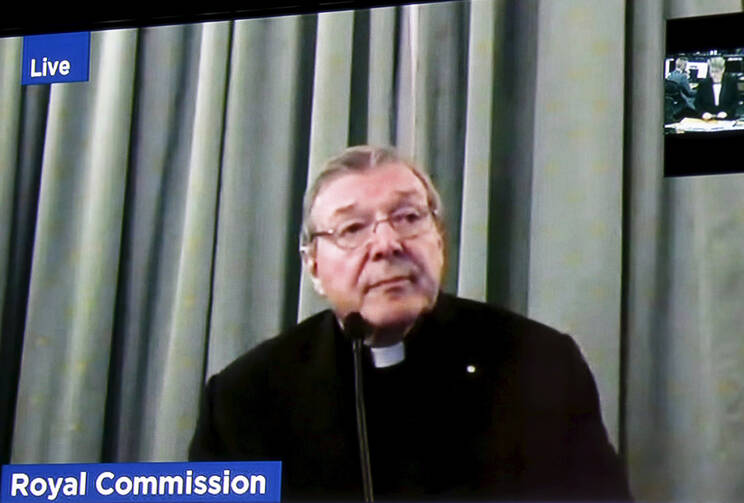On the third day of his testimony to the Royal Commission, Cardinal George Pell described the situation in the church in Australia where he served first as a priest in the 1970s and ’80s, and then as auxiliary bishop, from 1987 to '96, as “an extraordinary world of crimes and cover-ups and people not wanting the status-quo disturbed.”
He testified to the Royal Commission on Institutional Response to Child Sexual Abuse, on March 1, that he was “deceived” by Bishop Mulkearns and one or more consultors in Ballarat, and by Archbishop Frank Little and the Catholic Education Office in Melbourne because they had not shared crucial information with him about priests who were abusing children in those years. They failed to do so even when he served as a member on church bodies in both places that, among other things, advised those bishops on the placement of priests. He referred in particular to the cases of predator priests Gerald Ridsdale in Ballerat (now in prison) and Peter Searson in Doveton, Melbourne (now dead).
When, at different stages during the hearing, both the commission’s senior counsel, Gail Furness, and chairman, Peter McClellan, told him frankly that they found his evidence “implausible” and designed to deflect blame and responsibility from himself, Pell retorted, “I can only tell you the truth...I can only tell you the way it was.”
The seventy-four year old cardinal, one of the nine cardinal advisors to the pope and prefect of the Vatican’s Secretariat for the Economy, gave his testimony by video-conference from the Hotel Quirinale in Rome to the Royal Commission that is currently sitting in Sydney. Tuesday night’s session lasted five hours; it began at 10 p.m. and ended at 3 a.m. (Rome time).
It was the longest hearing so far and focused mainly on the situation at Doveton parish in the archdiocese of Melbourne, where Pell had been appointed auxiliary bishop on March 30, 1987. Many children and families in that parish had suffered under six consecutive abuser priests, the last of whom was Peter Searson. Pell was his auxiliary bishop from 1987 to 1996, since he was responsible for the south-east region of Melbourne.
Soon after becoming archbishop of Melbourne in July 1996, Pell appointed a senior barrister as the archdiocese’s commissioner on sexual abuse. The commissioner soon received allegations against Searson and in March 1997 the new archbishop suspended him from parish work indefinitely pending an inquiry into serious allegations against him. Later that year a Melbourne court convicted Searson for physical assault of an altar boy, and he was subsequently "retired" from the ministry. At last night’s hearing, the counsel cited much of the abuse done by the priest in those years, including sexually abusing children, holding a knife to a young girl’s chest and killing a bird with a screwdriver in front of children.
Asked by the counsel why he did not take action sooner to have the priest removed from the parish in those years, Pell blamed Melbourne’s archbishop and the Catholic Education Office for not sharing key information with him about Searson. He explained that he had taken the word of the archbishop and the Catholic Education Council but now realizes that he should have made a greater effort to find out more about this case, by “pushing a bit harder.” He regretted this failure.
In part defense, however, he argued that the priest was not removed from the ministry because the Melbourne police could not find sufficient evidence against him. Commenting on this statement, the royal commission’s chairman, McClellan, asked: “Doesn’t the church have responsibility to take action itself?”
In the course of the hearing, both the counsel and chairman of the commission asserted that the Australian church process had clearly “failed” to deal adequately with serious cases of abuse and failed to protect children. The counsel asked Pell whether he accepted part responsibility for that failure. The cardinal responded only “tangentially, marginally.”
Throughout his testimony this evening, Cardinal Pell sought to be conciliatory and at times expressed sorrow and regret at what had happened and at the fact that he should have done more in the face of this terrible reality, despite the deception and unwillingness to change that he had encountered.
At the same time he emphasized that “When I became archbishop I turned the situation right around so that the Melbourne Response procedures were light years ahead of all this obfuscation, and prevarication and deception.”
Near the end of the five-hour hearing, the cardinal admitted that as auxiliary bishop and a member of the Melbourne curia, in meetings with the archbishop on the placement of priests, he had agreed on one or perhaps two occasions to issuing statements regarding the resignation of priests from parishes that said this was happening for “reasons of health,” where in actual fact he knew the main reason was pedophilia. He acknowledged that this was “misleading.”
The Royal Commission is expected to conclude its hearing with the cardinal this evening. The session begins at 9 p.m. and ends at 1 a.m. (Rome time).
The group of survivors and family members of victims that have come from Australia to Rome for the hearing and have been present at all sessions, feeling let down by Pell’s testimony, decided to ask for a meeting with Pope Francis. They faxed him their request, and the cardinal promised to support this. They now wait in hope.








